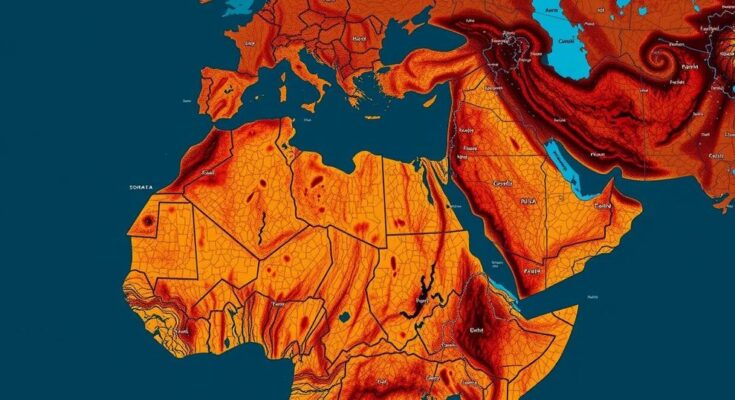A trilateral summit among Egypt, Eritrea, and Somalia in Asmara highlights a strategic alignment aimed at encircling Ethiopia amid regional security concerns. The meeting’s agenda focused on enhancing cooperation, amidst underlying tensions related to the Grand Ethiopian Renaissance Dam and Ethiopia’s proposed agreements with Somaliland. With Somalia’s military pact with Egypt and Eritrea’s collaboration, the geopolitical dynamics of the Horn of Africa are shifting, demanding urgent diplomatic responses from Ethiopia to sustain stability and regional relations.
The recent trilateral summit convened in Asmara, Eritrea, among the leaders of Egypt, Eritrea, and Somalia signifies a notable shift in the geopolitical landscape of the Horn of Africa, a region historically challenged by instability and competing national interests. Intended as an initiative to forge a unified stance against regional security concerns, the discussions subtly indicated a strategy aimed at encircling Ethiopia, the region’s influential nation beyond those borders. The talks, featuring Eritrea’s Isaias Afwerki, Egypt’s Abdel Fattah al-Sisi, and Somalia’s Hassan Sheikh Mohamud, focused on enhancing cooperation and preserving regional autonomy. The joint statement emphasized the critical nature of safeguarding territorial integrity and resisting external intervention. However, the subtext of the summit illuminated ongoing tensions concerning Ethiopia, particularly regarding its activities in relation to the Grand Ethiopian Renaissance Dam (GERD) and its recently proposed arrangement with Somaliland. Although Ethiopia was not explicitly named, the summit signaled deep concern over its actions, particularly the ongoing negotiations surrounding the GERD, which Egypt perceives as a fundamental threat to its water resources. Egypt’s discontent is palpable, especially with the impasse in negotiations rendering long-term solutions elusive. In a related maneuver, Somalia recently formalized a military pact with Egypt, corroborating their ties through arms supplies necessitated by the ongoing al-Shabaab insurgency. The evolving Cairo–Mogadishu axis indicates a diminishing alignment between Ethiopia and its immediate neighbors while bolstering Egypt’s assertive regional strategy. With Eritrea opting to ally with Egypt, it enhances its legitimate significance in the region, particularly in light of its geographic proximity to the strategic Bab el-Mandeb Strait. Moreover, Somalia’s historical grievances towards Ethiopia further consolidate its position alongside Egypt, reinforcing an unprecedented collaborative approach to counter Ethiopian influence. This regional recalibration may imply that the Horn of Africa is witnessing a power redistribution, veering away from traditional alignments. Central to this development is Egypt’s atypical involvement in the Horn, despite lacking direct borders with some involved nations. The recent diplomatic activities, including military assistance and participation in regional peacekeeping, reflect a broader strategy to independently challenge Ethiopia’s ascent. The implications of this alliance spark a potential escalation of tensions, especially as border clashes and the threat from extremist groups loom on the horizon. For Ethiopia, there is an urgent need for diplomatic engagement not only with its immediate adversaries, Egypt and Eritrea, but also crucially on the international stage. Securing support from powerhouses such as the United States while strengthening ties with Kenya and Sudan will be imperative in establishing a counterbalance in a precarious climate. Establishing a collaborative framework on Nile water management could alleviate stressors in the region. However, Ethiopia’s ability to navigate these shifting alliances will be pivotal in shaping its future prospects for security and stability.
The geopolitical environment of the Horn of Africa has been characterized by fragile alliances and historical tensions, particularly involving Ethiopia, Egypt, and Eritrea. Following decades of conflict, Eritrea gained independence from Ethiopia in 1993, yet lingering disputes have fostered persistent disharmony. The GERD is a key point of contention, representing Ethiopia’s ambitions for water resource management but regarded by Egypt as a direct threat to its vital water supply. Recent developments, including military agreements between Somalia and Egypt, illustrate the shifting dynamics wherein regional partnerships are realigning in response to Ethiopian policies, potentially reshaping the power balance in the Horn of Africa.
The summit involving Egypt, Eritrea, and Somalia underscores a profound transformation within the Horn of Africa, marked by emerging alliances aimed at countering Ethiopia’s influence. As these nations consolidate military cooperation, Ethiopia must proactively engage in diplomatic efforts to mitigate rising tensions. The effectiveness of Ethiopia’s approach, coupled with potential frameworks for resource management, will significantly influence the trajectory of regional stability. Navigating this complex landscape demands not only strategic alliances but also an understanding of the underlying historical grievances and security concerns prevalent in the Horn.
Original Source: thehill.com




